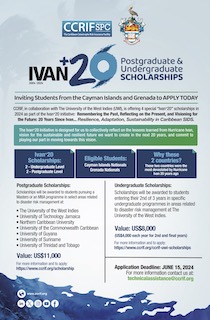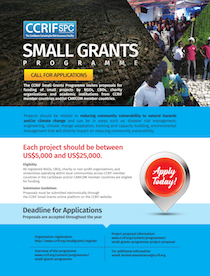Grand Cayman, Cayman Islands, October 20, 2023. CCRIF SPC made two payouts totalling US$3.4 million to the governments of Antigua and Barbuda and the British Virgin Islands following Tropical Storm Philippe. Philippe made landfall on Antigua and Barbuda on October 2nd and passed near the British Virgin Islands on October 4th, causing heavy rains and flooding in both countries. CCRIF made payouts on these countries’ parametric insurance policies for Excess Rainfall as follows:
- Antigua and Barbuda: US$2,880,424.
- British Virgin Islands: US$552,297 – this was the BVI’s first payout from CCRIF.
This payout to the Government of Antigua and Barbuda was its 3rd payout, having received payouts following Tropical Cyclone Irma in 2017 and an excess rainfall event in 2022. All CCRIF payouts are made within 14 days of the event.
Speaking to each of the two governments about the confirmed payouts, CCRIF CEO Mr. Isaac Anthony reiterated that each country can use its payout to address urgent priorities. Mr. Anthony continues to advise all countries in the region that “investment in CCRIF’s catastrophe risk insurance each year is an important part of their comprehensive disaster risk management strategies, as CCRIF payouts help to close the protection gap, reduce budget volatilities associated with exogenous shocks and allow governments to address the country’s most urgent needs. Whilst payouts are often used to address immediate needs after a disaster, governments can also implement activities to increase resilience against future hazard events, build back better and enhance social protection systems to become more shock-responsive”.
These two payouts bring the total CCRIF payouts since its inception in 2007 to US$265 million: CCRIF has made 62 payouts to 17 of its 26 members. Throughout the years, CCRIF member governments have used payouts to address immediate needs post disaster – from providing food, water, and medicines to the most vulnerable, to clearing roads and fixing bridges etc. Payouts have also been used for repairing and improving critical infrastructure such as schools and water treatment plants and supporting sectors such as tourism and agriculture.
CCRIF continues to monitor the hurricane season which, according to Philip Ktotzback from Colorado State University, has now produced 91 named storm days – the 8th most through October 19th on record. CCRIF is watching closely Tropical Storm Tammy which is being forecasted to impact several CCRIF member countries this weekend, including Antigua and Barbuda, Montserrat, St. Kitts and Nevis, Anguilla, and St. Maarten.
A country’s CCRIF policy is triggered when the modelled loss for a hazard event in that country equals or exceeds the attachment point (similar to a deductible in a traditional insurance contract) selected by the country, which is specified in the policy contract between CCRIF and the country. Unlike traditional indemnity insurance policies, CCRIF’s parametric insurance policies make payments based on the intensity of a natural hazard event (for example, hurricane wind speed, earthquake intensity, or volume of rainfall), the exposure or assets affected by the event, and the amount of loss caused by the event, calculated in a pre-agreed model. Thus, CCRIF does not need to wait for countries to make claims based on an on-the-ground assessment of loss and damage and can disburse funds quickly to members if their policies are triggered.
About CCRIF SPC:
CCRIF SPC is a segregated portfolio company, owned, operated and registered in the Caribbean. It limits the financial impact of catastrophic hurricanes, earthquakes and excess rainfall events to Caribbean and Central American governments by quickly providing short-term liquidity when a parametric insurance policy is triggered. It is the world’s first regional fund utilising parametric insurance, giving member governments the unique opportunity to purchase earthquake, hurricane and excess rainfall catastrophe coverage with lowest-possible pricing. CCRIF was developed under the technical leadership of the World Bank and with a grant from the Government of Japan. It was capitalized through contributions to a Multi-Donor Trust Fund (MDTF) by the Government of Canada, the European Union, the World Bank, the governments of the UK and France, the Caribbean Development Bank and the governments of Ireland and Bermuda, as well as through membership fees paid by participating governments. In 2014, a second MDTF was established by the World Bank to support the development of CCRIF SPC’s new products for current and potential members and facilitate the entry of Central American countries and additional Caribbean countries. The MDTF currently channels funds from various donors, including: Canada, through Global Affairs Canada; the United States, through the Department of the Treasury; the European Union, through the European Commission, and Germany, through the Federal Ministry for Economic Cooperation and Development and KfW. Additional financing has been provided by the Caribbean Development Bank, with resources provided by Mexico; the Government of Ireland; and the European Union through its Regional Resilience Building Facility managed by the Global Facility for Disaster Reduction and Recovery (GFDRR) and The World Bank.






